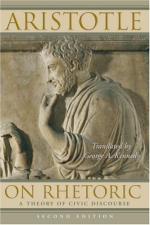
|
| Name: _________________________ | Period: ___________________ |
This quiz consists of 5 multiple choice and 5 short answer questions through Book I, Chapters 10-15.
Multiple Choice Questions
1. Which tactic was not included as something that an epideictic rhetorician might use?
(a) Amplification.
(b) Comparison.
(c) Exaggeration.
(d) Competition.
2. What knowledge did Aristotle think was required by political rhetoric?
(a) The most effective forms of government.
(b) At least one form of government.
(c) At least two forms of government.
(d) Various forms of government.
3. Included in Aristotle's definition of a rhetorician, which parts of a claim should be adapted to a situation?
(a) Speech, tone, and style.
(b) Tone and style, but not speech.
(c) Speech and tone, but not style.
(d) Speech and style, but not tone.
4. Which of the following did Aristotle think were more likely to commit crimes?
(a) Ignorant people.
(b) Malicious people.
(c) Clever people.
(d) Weak people.
5. According to Aristotle, what was the most basic cause of pleasure?
(a) Some kind of action in accordance with one's desires.
(b) Some kind of action in accordance with one's nature.
(c) Some kind of action in accordance with one's abilities.
(d) Some kind of action in accordance with one's instincts.
Short Answer Questions
1. Besides goodness itself, what else did Aristotle indicate a political orator must deal with?
2. How many causes of human action did Aristotle detail in Book I, Chapter 10?
3. As discussed by Aristotle, how many modes of persuasion did rhetoric use?
4. In the beginning of the book, which one of the following did Aristotle indicate about rhetoric?
5. As explained in Book I, Chapter 14, which things should be considered when deciding the unjustness of an action?
|
This section contains 286 words (approx. 1 page at 300 words per page) |

|




